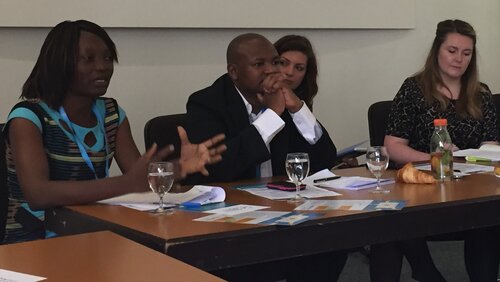UHC2030 is excited to welcome several new and distinguished...
12 June 2017
Civil society meets to discuss progress towards UHC

A strong CSO and grassroots presence in UHC2030 is critical to influence key processes and decision-making at the global level. At country level, CSOs need to come together in coalitions and networks to speak with ‘one voice’. These are some of the key messages to come out of a meeting of the UHC2030 Civil Society Engagement Mechanism in May during the 70th World Health Assembly.
The UHC2030 civil society engagement mechanism organised a briefing to inform each other and exchange about how CSOs can engage meaningfully in UHC2030. The event was an opportunity for CSOs and others actors to better understand the aims and processes of UHC2030 and discuss the best roles for CSOs.
Marjolaine Nicod from the UHC2030 secretariat introduced UHC2030 as the global movement to build strong health systems in countries in order to promote universal health coverage (UHC). It is a platform for collaborative working, advocacy, accountability, and knowledge sharing. All partners with an interest in UHC are welcome to join including governments, international organisations, CSOs, the private sector, and philanthropic foundations. UHC2030 needs the drive of CSO’s to achieve UHC. Civil Society organizations are, in many countries, key actors in delivering health services and advocating for increased resources, transparency, and accountability.
Annick Jeantet from the interim secretariat of CSEM argued for the need to have a strong CSO presence in UHC2030 to influence discussions and decision making at global level and ensure the needs of the world’s most vulnerable people are taken into consideration.
Aminu Maghasi Gargo, Coordinator of Africa Health Budget Network in Nigeria expressed his view on how much communities are needed in this partnership and highlighted the necessity to build on what exists at national and regional level. He encouraged coordination between CSO platforms and networks to avoid fragmentation and push for harmonization; this will help CSOs speak with one voice to the government.
Valérie Sorgho, Advocacy and Communication Officer for Save the Children, Burkina Faso gave a concrete example about CSO advocacy work towards UHC at country level. She spoke about the creation of a CSO coalition and how it was successful in delivering messages that ensured UHC policies set up by the government included access to health services for women and children. She also insisted on the need for the UHC2030 CSEM to create a unique dynamic to provide information and feedback to decision-makers at the global level.
Aurélie du Châtelet, Health and nutrition advocacy advisor, Action contre la Faim shared her conviction about the need for nutrition to be integrated in health and what UHC2030 and the CSEM could contribute to this aim.
During the exchange participants noted that the movement is not set in stone, but it is about building a process. The need to bring people and organizations on board to talk about how it should evolve is crucial. The CSEM should be careful not to speak on behalf of the whole of civil society. It is vital to include grassroots organizations who can explain what UHC means to people and what works best for them. Participants also highlighted the need to build the capacity within the CSEM to support CSOs in country to get involved in the movement and strengthen advocacy.
